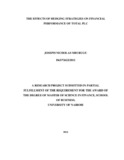| dc.description.abstract | Reducing corporate risks through hedging strategies has gained prominence with firms in
the contemporary globalized market making more imperative the identification and
administration of the corporate exposure to sources of risk, such as the foreign exchange
rates, interest rates, equity securities and commodity prices. This formed the nexus of the
study whose objective was to establish the effect of hedging on firm performance while
controlling for firm size, leverage and growth. This study adopted explanatory research
design and allowed the researcher to quantitatively through hypothesis testing measure
relationships between variables. The study relied solely on quarterly data for the period
2006Q1-2014Q2. This involved integrating financial reports/data as a main procedure to
gather accurate, less biased data and increase the quality of data being collected.
Correlation analysis, co-integration analysis and error correction were carried out to
determine whether there are short run or long run effects of hedging on performance.
Findings from correlation analysis revealed that there is a negative and statistically
significant relationship between hedging firm performance, (r=-0.5026, pvalue=0.004<0.05).
Correspondingly, findings of the ordinary least squares regression
analysis showed that there is a very weak negative and statistically significant
relationship between hedging and firm performance, (-1.11E-05 p-value=0.01<0.05). In
addition, results from cointegration analysis could not confirm long run effect of hedging
on firm performance. However, error correction revealed that there is a negative short run
effect of hedging on performance. The study concluded that leverage dampen firm
performance as funds allocated to trading in derivatives for speculative purposes amount
to misapplication of funds from the core business of the company. The study therefore
recommends that firms should diversify their leverage strategies and introduce robust and
tested econometric and financial models to forecast international oil prices. Further, the
study recommends that regulatory authorities should work together in conjunction with
industry players to put in place relevant policy, legal and regulatory framework to limit
monopolistic tendencies in the international oil market. | en_US |

